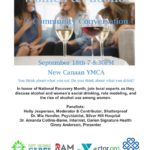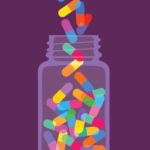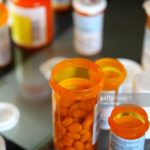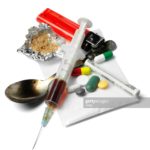ALCOHOL & DRUG RESOURCES
CARES Programs & Resources

CARES Program, Kevin A, Sabet, PhD
Smart Approaches to Marijuana (SAM) promotes an evidence based approach to marijuana policy that prioritizes public health.

CARES Program
Explore the physiology of addiction with Ruth A. Potee, MD. A recording of this program can be viewed here.

Women and Alcohol: A Community Conversation
CARES Program
You think about what you eat. Do you think about what you drink? Join local experts as they discuss alcohol and women’s social drinking, role modeling, and the rise of alcohol use among women. A recording of this program can be viewed here.
Additional Resources

Drug Enforcement Administration (DEA)
Fentanyl is being pressed into fake pills made to look like OxyContin®, Xanax®, Adderall®, and other pharmaceuticals. These fake pills contain no legitimate medicine.

International Overdose Awareness Day
An overdose means having more of a drug (or combination of drugs) than your body can cope with. There are a number of signs and symptoms that show someone has overdosed, and these differ with the type of drug used. All drugs can cause an overdose, including prescription medication prescribed by a doctor. It is important to know the right amount and the right time to take your medication. It is also vital to know what drugs should not be mixed, and to seek help if you feel you are not in control of your drug use

International Overdose Awareness Day
North America continues to experience the highest drug-related mortality rate in the world, accounting for one in four drug-related deaths globally, the United Nations Office on Drugs and Crime reports. In April 2021, the Centre for Disease Control has estimated that the number of people in the USA who had died from overdose in the 12-month period to the end of September 2020 was 90,237.

Foundation for Advancing Alcohol Responsibility
Parents: navigating the teenage years with our children can prove overwhelming. From academics and sports, to social media and technology, kids are faced with countless pressures and often times, risky situations. It’s important for parents to guide their teens, and their developing brains, through a healthy lifestyle. As kids become adults and go through changes and transitions, it’s important to keep having conversations.
Pediatric emergency room doctor Katie Friedman discusses how parents should talk to their kids about alcohol and other risky behaviors, such as underage cannabis use. She opens up about brain science and how conversations with kids should be seen as teachable moments in the ongoing effort to keep kids substance-free.

Get Smart About Drugs: A DEA Resource for Parents, Educators & Caregivers
Parenting can be the greatest job on earth—and the toughest. You want your children to be healthy, but you worry about what they will do when faced with the decision to try drugs or alcohol.

The Washington Post
Most parents don’t want their teens to binge drink. But parents who attempt to provide safe parameters — like having teens drink in the basement with friends — increase the likelihood that their offspring will become binge drinkers.

Partnership to End Addiction
Parents often find themselves between a rock and a hard place when raising teens. It’s a delicate balance respecting your child’s growing independence while still needing to set rules and boundaries. Finding the right balance requires effective communication, making constant adjustments and staying in touch with what’s going on in their life.

New Canaan Police Department
There is a drop box located in the New Canaan Police Station lobby for household disposal of any unwanted medications, including pet medications. Residents are encouraged to dispose of their unwanted medications on a regular basis to prevent their misuse or abuse.

Sports Illustrated
A special report from L. Jon Wertheim and Ken Rodriguez on the rising use and abuse of heroin among young athletes across the U.S. and the connection between sports, painkillers and heroin addiciton.

TheDarienite.com
The widespread abuse of painkillers derived, like heroin, from opium, and falling prices for heroin in recent years and months, the problem has grown. After trying heroin or abusing painkillers, addiction can start in less than a week and be extremely difficult to break.

